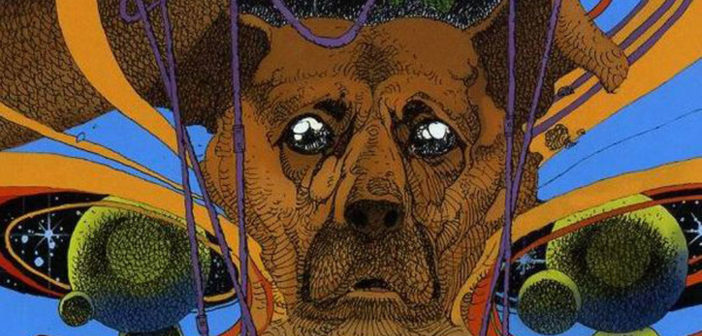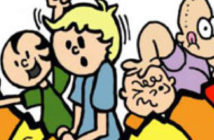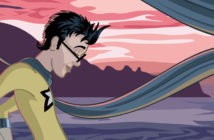There’s no one defining hero in Brian and Philip Phillipson’s God the Dyslexic Dog. There are several players, but no one is concretely the star of the performance. But personally, I like to think its Bacchus, the patron deity of wine and revelry. I’m sure the creators would disagree with me, but I don’t care. I like wine. A whole lot.
Bacchus is the least boring of all the gods out there in world myth that the Phillipsons have included in their canine epic, save God the Dog himself. Christopher Hitchens put it best in his memoir, Hitch-22, when he briefly spoke about the parlor tricks of Jesus: “The only worthwhile miracle in the New Testament—the transmutation of water into wine during the wedding at Cana—is a tribute to the persistence of Hellenism in an otherwise austere Judaea.”
That’s not to imply that God the Dyslexic Dog is tedious—far from it. This series of three trade paperbacks is a feverish odyssey that traverses the borders of mysticism and science. Certain portions of the journey are more successful than others, but the overall voyage is never boring. Do not fear: entertainment with this series is always guaranteed.
In the first volume of Dyslexic Dog, the creation of the universe at the hands of a wise, old poet takes place. He looks like a hybrid of Gandalf the Grey from The Lord of the Rings and the god-king Odin of Norse mythology—it’s all owed to the gray, wide-brimmed hat. With the birth of the cosmos comes the existence of gods and humans. And to keep it all in check is an inversion of the anthropomorphized universe: Dog. Man’s best friend is intended to guide humanity as both a friend and ally along the journey of life.
This poses the question as to the purpose of the gods in the scenario. They’re there if we choose to believe in them, but restrained by Pandora and her box if we wish to be left alone. That’s, of course, until Bacchus decides to be a troublemaker and frees the gods from the confines of the box, unleashing them to force themselves upon the world to avoid being forgotten. Thankfully, Dog roams the world in an effort to slay the stray gods who threaten his favored humanity.
This is but a bare synopsis of the book’s premise. Alas, it’s all I can manage. The pages are literally packed with goings on: I’ve left out the god Darwin and his attempt to adapt evolution to favor the survival of the other deities as his own personal slaves and soldiers. I’ve also failed to mention the missing link that separates us from the apes. And I can’t forget Nez, the dyslexic son of a pet psychic who is destined to help Dog in setting everything right. Lastly, Pavlov makes an important appearance. See what I mean?
In many ways, God the Dyslexic Dog is one of the most courageous independent books I’ve read in a long time because of all of the strange twists and turns it has the wit to embark on. It’s a tale of mythology and the natural order all sloshed together. But there are times when the comic as a whole is wildly incoherent—it’s fun but maddening. I was left saying “Why?” and scratching my head more times than I’d like.
Still, Bacchus manages to shine as the poignant hero here. He’s a misanthrope and a nihilist, make no mistake: he’s slaying the animal-gods created by Darwin intended to force humanity into submission. But the patron of liquor and his following of Revelers will have none if it. They all intend to live for themselves, even if that means mowing down the heavens while waiting for the end times. It’s weird, and yet, intoxicating. But then again, he is Bacchus for a reason.
This is a story of courage, and for that it should be admired. Though, it’s not for the weak of mind. It’s challenging, but thus far, it’s proven to be a worthwhile. There’s one more book left in this trilogy, and who knows how it will conclude. Will sanity be restored? I doubt it, but I am sure we’ll all have a good time regardless.
This comic book review originally appeared on Broken Frontier.





2 Comments
It’s tough to find reviews of older, mostly forgotten, books by indie creators. Thanks! It’s the Nino art that’s my draw here. You didn’t mention it, but I’m assuming you would have if it was distracting… as Alex N. can be.
I’m happy you found the review and found something worthwhile in it. I haven’t reviewed comic books in years, but I don’t lie. I’ve had an itch to go to Comic Con this year to check out the indie creators and patron their work. That’s how I met the ‘Dyslexic Dog’ guys many years ago. Now I feel old, haha!